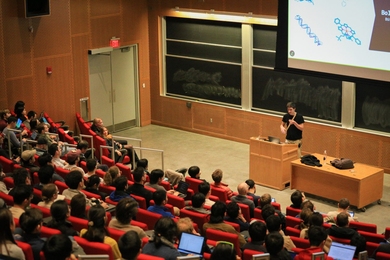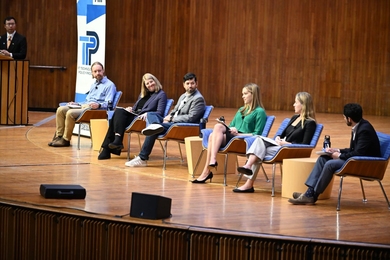MIT asked a court last week to bar disclosure to the press of confidential conversations and other facts that current or former MIT students have been subpoenaed to provide to the attorney for the family of Elizabeth Shin.
The court agreed with the need to protect the students' confidential information, and asked counsel for MIT and the Shins to work out an agreement that assured that protection.
MIT also won the right to provide legal counsel, at MIT's cost, to such students if they wish to have it. Middlesex Superior Court Judge Judith Fabricant denied the motion by David Deluca, the Shin family attorney, that would have disqualified MIT's counsel, Palmer & Dodge, from representing the students.
In MIT's emergency motion for a "protective order concerning confidential information of MIT students," attorney Daryl J. Lapp wrote that the student subpoenas "will result in the discovery of a significant amount of confidential, and in some cases highly sensitive, information concerning present and former MIT students other than Ms. Shin. For example, these present and former students will be required to divulge their personal conversations with Ms. Shin and their private e-mail correspondence with her."
Lapp stated, "The plaintiffs have demonstrated their intent to seek widespread publication of discovery materials concerning this case."
Lapp wrote, "As of the filing of this motion, counsel for the plaintiffs has refused to agree to refrain from publishing any or all of this discovery material to the press or others outside the limited circle of the parties, their counsel and experts who have a legitimate need to know this information for purposes of litigating this case ...
"The plaintiffs have hired a public relations firm in connection with their suit, and have embarked on an aggressive campaign to publicize not only their claims but also a wide range of discovery materials pertaining to this case ...
"In addition, counsel for the plaintiffs has delivered to a number of media outlets one or more CD-ROM computer discs containing a wide range of documents, including Ms. Shin's psychiatric records. Upon information and belief, a number of documents on these CD-ROMS refer to students other than Ms. Shin.
"Perhaps the best illustration of the plaintiffs' intention to litigate this case in the press--and more importantly the insensitivity of plaintiffs' counsel to the legitimate privacy interests of student-witnesses--concerns plaintiffs' motion to disqualify Palmer & Dodge from acting as counsel for the student witnesses in connection with their depositions."
Lapp noted that the plaintiff's public relations firm had sent a reporter an e-mail on that motion and included an "entirely unnecessary" disclosure of the names of individual students and their role in the case.
Judge Fabricant stated at the Feb. 27 hearing that a protective order was appropriate, and that the MIT drafted order would be in place until counsel for MIT and the Shins can agree on another wording. She said she would impose an order if the attorneys failed to agree.
A version of this article appeared in MIT Tech Talk on March 6, 2002.





